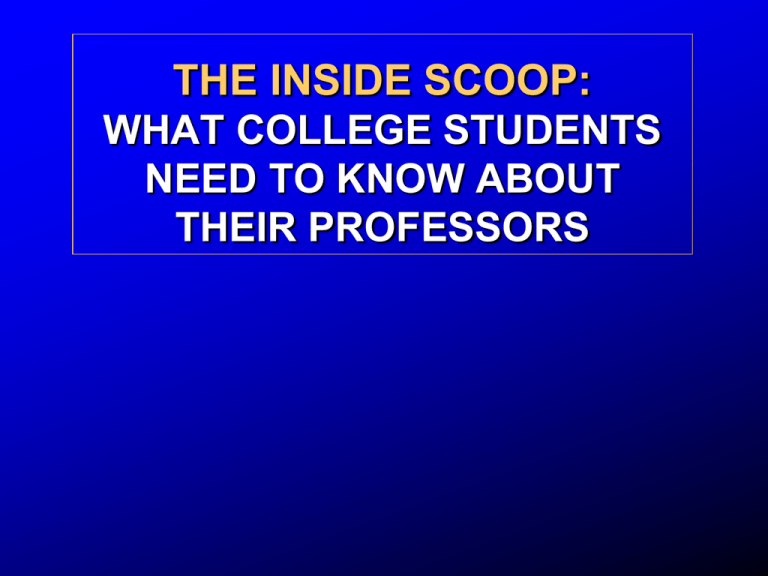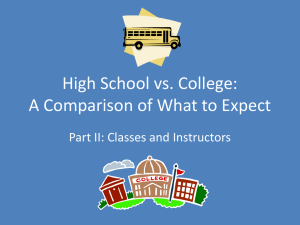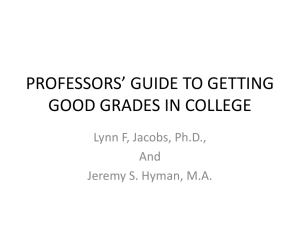The Inside Scoop: What College Students Need to Know About
advertisement

THE INSIDE SCOOP: WHAT COLLEGE STUDENTS NEED TO KNOW ABOUT THEIR PROFESSORS Overview Of What You Need To Know: Rules Of Etiquette Get to know who your teachers are on a professional level. Understand that they have dual-roles. Know that teachers have expectations set for their students. Understand that attendance matters. Know how to be a model student. Brainstorming Activity Two minutes Write down a list of things you think your professors expect from their students. Write down a list of possible pet peeves that instructors have of their students. Who Is My Teacher? Different Teaching Roles Teachers’ Assistant: Currently enrolled in college – assists the teacher. Graduate Assistant: Currently enrolled in graduate school – role varies. Instructor: Has expertise in their field, but does not have a Ph.D. Professor: Is an expert in their field and has a Ph.D. ***BECAUSE MOST TEACHERS AT EIU ARE PROFESSORS, I WILL USE THIS TERM THROUGHOUT THIS PRESENTATION Facts You Should Know About Your Professor All professors are not required to take classes on how to teach or design syllabi, tests, and quizzes. o This is not a requirement for all professors with advanced degrees. o Different graduate training programs have different course requirements. Professors are different from high school teachers. o They have set higher standards for you simply because you are in college. Professors Are Busy Outside Of The Classroom In order to be promoted or tenured, aside from teaching multiple courses, most professors are required to be involved in: A variety of research. Publishing activities. Advising students in their department. Supervising graduate students. Participating in community activities. Professors have a variety of things that keep them VERY busy all of the time. What Does My Professor Expect From Me? Professors expect you to read the syllabus and refer to it in order to know how you will be graded for attendance, reading assignments, tests, projects, etc. They expect you turn assignments in on time. They expect you to have the desire to learn the material they are teaching. They expect you attend and to be on time for each class. What Do They Expect When I Come to Visit During Office Hours? When you schedule a meeting, BE ON TIME! Be prepared to address specific questions, issues, comments, and/or concerns. Address them properly (Dr. Mr. Ms.) and pronounce their name correctly. Take responsibility for your actions. Don’t whine or blame others for poor attendance/ grades. Don’t discuss a test or assignment when you are angry. Ask for help. “Professors Don’t Care if I Attend Class…They Get Paid Regardless” PROFESSORS DO CARE! o They chose this job as their profession to help you obtain a higher level of education. Some professors say that they don’t care about class attendance, but don’t believe it! They notice who is in attendance and who is not. Flat Tire, Sick? Leave a message for your professor (voicemail, email etc.) to let them know you had an emergency and will not be in attendance for class. o Be professional when trying to get in contact with your professor. You may want to visit your professor during office hours to catch up on missed concepts. Get notes from someone you trust. Professors Hate When Students Are Late! The first few minutes of class are often used for important announcements such as changes in the syllabus or assignments. Being late is often disruptive. o The smaller the class, the more disruptive it is. If you come in after attendance has been taken, you may be marked absent. Many professors will deduct attendance points for tardiness. Better Late Than Never? Watch how your professors respond to other classmates who are late, then guide your actions accordingly. During the first class period you should ask your professors about his or her preferences about this commonly asked question. What are your thoughts about this saying? Now That You Are In Class… Come prepared! Sit in the front row. o There is a positive correlation between sitting in the front of the classroom and getting better grades. Have a notebook and something to write with. Bring any books or articles that are related to the chapters that are being covered. When you are prepared, you communicate an interest in the subject. Almost all professors will treat you as if their course is the only one that you are taking. Once you know what professors expect, you can become a model student. Professors Notice The Model Students In Their Classes Attend every class. Come prepared for the lecture (READ). Participate in class discussions. Ask questions after first having tried to figure out the answers on your own. How To Be A Model Student Avoid the Following In Class: Reading the newspaper. Yawning. Stretching. Having side conversations. Answering your cell phone. Sending text messages on cell phones. “It Is Not Only What You Say, But How You Say It” Ask questions in a courteous and positive manner: “Could you elaborate on….” “Could you clarify…” Avoid negative phrases: “I don’t see how…” “Don’t you think…” Make relative statements: “It seems to me…” “I think…” “Perhaps…” Avoid absolute statements: “Everybody knows…” “The fact is…” “Any idiot can see…” Why Should I Care What My Professors Think? Professors are resourceful when it comes to writing letters of recommendation for jobs, scholarships, internships, student honor societies, etc. Professors determine the grades that you have earned in their courses. They may be able to cut you some slack if something unexpected happens in your life. Questions? Need More Help? Visit the Student Success Center (217) 581 – 6696 cboyer@eiu.edu I hope you enjoyed the presentation!










